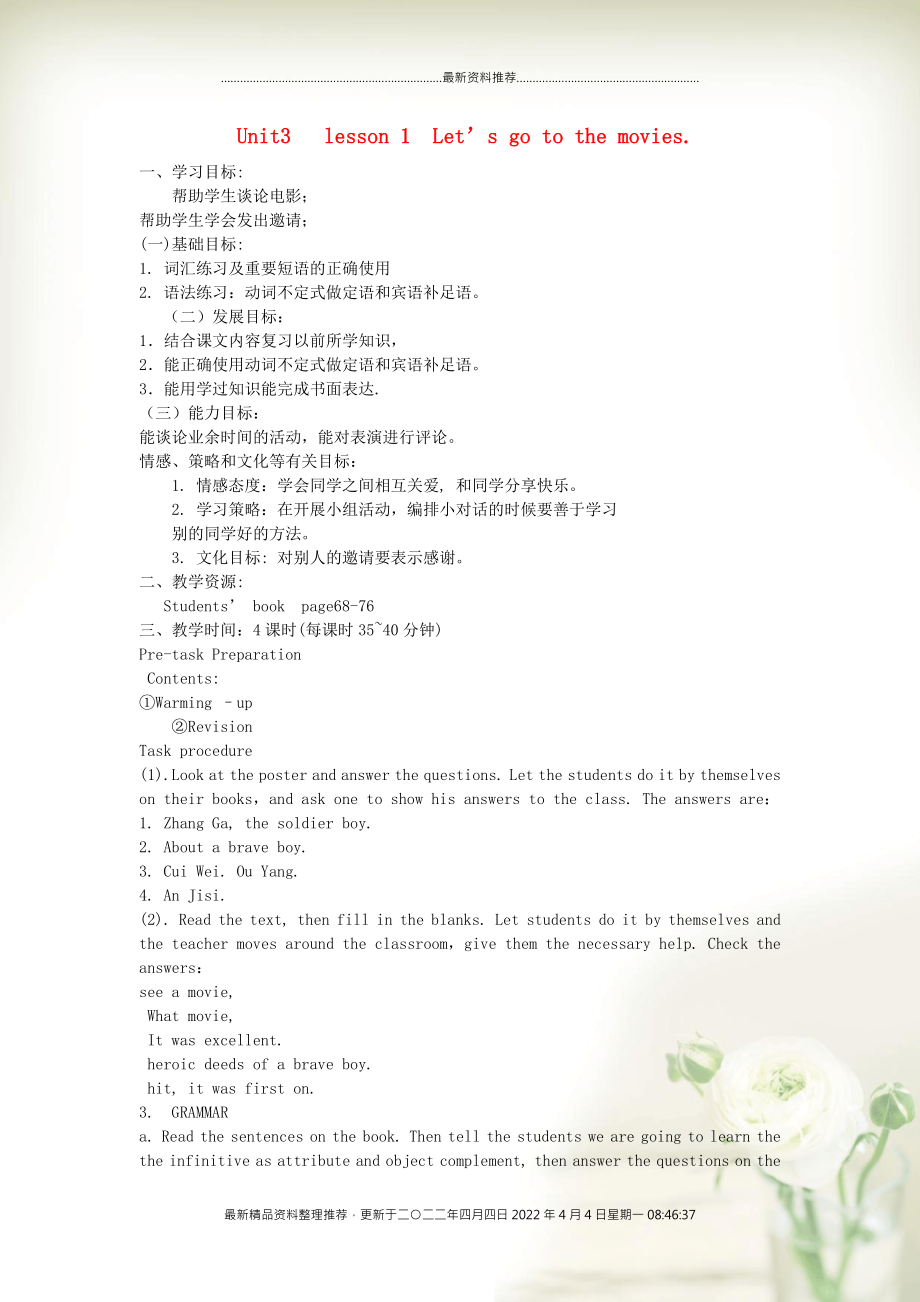《【金識(shí)源】八年級(jí)英語(yǔ)下冊(cè) Unit 3 Lesson 1 Let’s go to the movies教學(xué)設(shè)計(jì)2 上海新世紀(jì)版》由會(huì)員分享���,可在線閱讀�����,更多相關(guān)《【金識(shí)源】八年級(jí)英語(yǔ)下冊(cè) Unit 3 Lesson 1 Let’s go to the movies教學(xué)設(shè)計(jì)2 上海新世紀(jì)版(3頁(yè)珍藏版)》請(qǐng)?jiān)谘b配圖網(wǎng)上搜索�����。
1��、……………………………………………………………最新資料推薦…………………………………………………
Unit3 lesson 1 Let’s go to the movies.
一�、學(xué)習(xí)目標(biāo):
幫助學(xué)生談?wù)撾娪埃?
幫助學(xué)生學(xué)會(huì)發(fā)出邀請(qǐng);
(一)基礎(chǔ)目標(biāo):
1. 詞匯練習(xí)及重要短語(yǔ)的正確使用
2. 語(yǔ)法練習(xí):動(dòng)詞不定式做定語(yǔ)和賓語(yǔ)補(bǔ)足語(yǔ)����。
(二)發(fā)展目標(biāo):
1.結(jié)合課文內(nèi)容復(fù)習(xí)以前所學(xué)知識(shí),
2.能正確使用動(dòng)詞不定式做定語(yǔ)和賓語(yǔ)補(bǔ)足語(yǔ)��。
3.能用學(xué)過(guò)知識(shí)能完成書面表達(dá).
(三)能力目標(biāo):
能談?wù)摌I(yè)余時(shí)間的活動(dòng)���,能對(duì)表演進(jìn)行評(píng)論�。
情感����、策略和
2�����、文化等有關(guān)目標(biāo):
1. 情感態(tài)度:學(xué)會(huì)同學(xué)之間相互關(guān)愛(ài), 和同學(xué)分享快樂(lè)�����。
2. 學(xué)習(xí)策略:在開展小組活動(dòng),編排小對(duì)話的時(shí)候要善于學(xué)習(xí)
別的同學(xué)好的方法�����。
3. 文化目標(biāo): 對(duì)別人的邀請(qǐng)要表示感謝����。
二、教學(xué)資源:
Students’ book page68-76
三�����、教學(xué)時(shí)間:4課時(shí)(每課時(shí)35~40分鐘)
Pre-task Preparation
Contents:
①Warming –up
?、赗evision
Task procedure
(1).Look at the poster and answer the question
3、s. Let the students do it by themselves on their books�����,and ask one to show his answers to the class. The answers are:
1. Zhang Ga, the soldier boy.
2. About a brave boy.
3. Cui Wei. Ou Yang.
4. An Jisi.
(2). Read the text, then fill in the blanks. Let students do it by themselves and the teache
4����、r moves around the classroom,give them the necessary help. Check the answers:
see a movie,
What movie,
It was excellent.
heroic deeds of a brave boy.
hit, it was first on.
3. GRAMMAR
a. Read the sentences on the book. Then tell the students we are going to learn the the infinitive as a
5����、ttribute and object complement, then answer the questions on the book.
動(dòng)詞不定式是由“to+動(dòng)詞原形”構(gòu)成 (有時(shí)可以不帶to)�����。其否定形式是“not+動(dòng)詞不定式”(not不與助動(dòng)詞連用)�。它屬于一種非謂語(yǔ)動(dòng)詞的形式��,在句子中不能充當(dāng)謂語(yǔ)�����,沒(méi)有人稱和數(shù)的變化�,但它可以保留動(dòng)詞的性質(zhì),其本身可以帶賓語(yǔ)或狀語(yǔ)等附加成分(不定式和其附加成分稱為不定式短語(yǔ))�。動(dòng)詞不定式(短語(yǔ))的句法功能非常廣泛,在句中可作主語(yǔ)�、賓語(yǔ)、補(bǔ)足語(yǔ)���、表語(yǔ)����、定語(yǔ)及狀語(yǔ)等成分�����。
I. 作補(bǔ)足語(yǔ)
(1)某些動(dòng)詞在主動(dòng)式中后接動(dòng)詞不定式作賓語(yǔ)補(bǔ)足語(yǔ)�����;在
6��、被動(dòng)式中�,由于原來(lái)的賓語(yǔ)變成了主語(yǔ),故原來(lái)的賓語(yǔ)補(bǔ)足語(yǔ)變成了主語(yǔ)補(bǔ)足語(yǔ)�����。這類動(dòng)詞常用的有 consider, expect, tell, want, warn, wish����,invite等。例如:
They told him not to be late again.他們告訴他不要再遲到了���?�!鶫e was told not to be late again.
She invited me to have dinner with her yesterday.昨天她請(qǐng)我一起進(jìn)餐����。
(2)在feel(一感),listen to��,hear(二聽(tīng))��,let��,make����,have(三讓),look a
7�����、t�,see,watch��,notice(四看)等詞之后接不帶to的不定式作賓語(yǔ)補(bǔ)足語(yǔ)��,強(qiáng)調(diào)動(dòng)作的完成過(guò)程�����;它們作被動(dòng)句的謂語(yǔ)時(shí),to要補(bǔ)上��。如:
I heard her sing today.She sang wonderfully.今天我聽(tīng)見(jiàn)她唱歌了�,她唱得非常精彩�。
She was heard to sing today.今天有人聽(tīng)見(jiàn)她唱歌了。
She is often heard to sing this song(by us).我們經(jīng)常聽(tīng)見(jiàn)她唱這首歌�。
II. 作定語(yǔ)
(1)動(dòng)詞不定式常常放在名詞或不定代詞后面作后置定語(yǔ),其邏輯主語(yǔ)往往是句子的主語(yǔ)�,故動(dòng)詞不定式作定語(yǔ)時(shí)往
8、往用主動(dòng)式����;如果動(dòng)詞不定式的邏輯主語(yǔ)不是句子的主語(yǔ),該動(dòng)詞不定式要用被動(dòng)式���。例如:
Do you have anything to do tonight? 你今晚有什么事要做嗎?
I am going to Shanghai tomorrow. Do you have anything to be taken there? 明天我要去上海��。你有什么東西要捎去的嗎?
(2)動(dòng)詞不定式作定語(yǔ)往往表示尚未發(fā)生的動(dòng)作����,如果動(dòng)作已發(fā)生或正在發(fā)生�����,一般用現(xiàn)在分詞作定語(yǔ)。例如:
I have no pen to write with.我沒(méi)有鋼筆寫字�。
The man standing th
9、ere is Li Ming. 站在那里的那個(gè)人是李明���。
b. Do some exercises and then check the answers in class, find what the difficulties are.
4. Reading
Read the passage and choose the best answers.
Tell the students to read the passage carefully��,and think it over�,then complete it. First ask the students tal
10���、k about his or her answers with classmates.
5. Listening
Listen and choose the best response to what you hear. First listen only, then do it the second time.
四��、Homework:
Write an invitation.
五�、板書設(shè)計(jì):
Unit3 lesson 1 Let’s go to the movies.
六�、教學(xué)反思:
通過(guò)學(xué)生們的完成習(xí)題情況,可以看出對(duì)本課知識(shí)掌握的較好���。
最新精品資料整理推薦��,更新于二〇二二年四月四日2022年4月4日星期一08:46:37
 【金識(shí)源】八年級(jí)英語(yǔ)下冊(cè) Unit 3 Lesson 1 Let’s go to the movies教學(xué)設(shè)計(jì)2 上海新世紀(jì)版
【金識(shí)源】八年級(jí)英語(yǔ)下冊(cè) Unit 3 Lesson 1 Let’s go to the movies教學(xué)設(shè)計(jì)2 上海新世紀(jì)版

